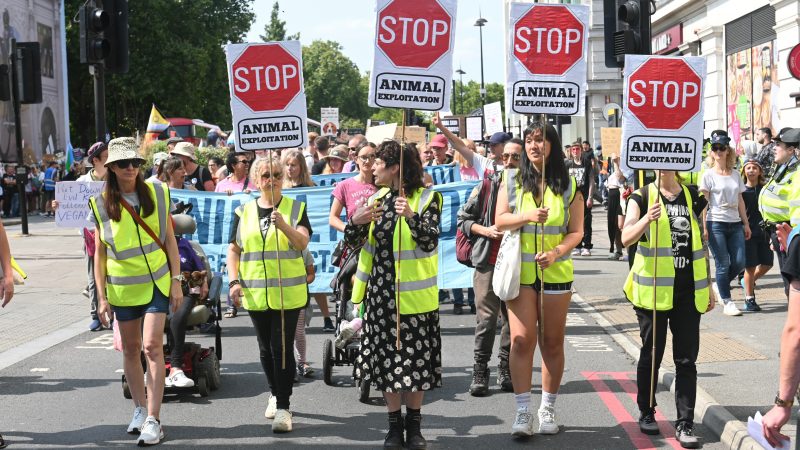
The publication of the latest statistics on animal use in scientific procedures offers an opportunity to reflect. While the numbers may show a small decrease in animal experiments, they also serve as a reminder of how far we must still go to fulfil our ambition of phasing out the use of animals in medical research.
The figures show that 2.64 million procedures involving animals took place in 2024 – a 1.21% decrease compared to the previous year. Animals used include cats, dogs, horses, mice, rats and monkeys. 52% of procedures carried out for experimental purposes were for basic research, which are not required to use animals by regulation or law and 1,207,558 animals were used in the creation of genetically altered animals, but were not used in experiments.
These are not just numbers. Each animal used represents a living being that endured distress in the name of science. As a nation that takes pride in both its kindness to animals and its scientific excellence, we must continue to ask ourselves whether this is the best way forward and, crucially, how we can accelerate the transition to modern, humane and more effective methods of research.
READ MORE: ‘A Labour blueprint for inclusive growth’
When I visited the Research Innovation Learning and Development (RILD) Centre in Exeter, to see Animal Free Research UK’s Animal Replacement Centre of Excellence, I saw what that future could look like. There, researchers are making remarkable progress studying cell ageing using cutting-edge human-specific models. Their work is already driving innovation without reliance on animals. This is proof that excellent science and ethical practice can advance together.
Across the UK, similar breakthroughs are being made in laboratories that have embraced new technologies, from organ-on-a-chip systems and 3D tissue models to AI-powered data analysis. These methods not only spare animal suffering but also offer more accurate predictions of how human bodies will respond to treatments. Around 92 per cent of drugs that pass animal tests fail in human trials, often because animal biology simply doesn’t mirror our own. We can – and must – do better. As a member of the Science, Innovation and Technology Committee and the APPG on Phasing Out Animal Experiments in Medical Research, I believe we need a clear and coordinated plan to end reliance on outdated animal-based models.
Subscribe here to our daily newsletter roundup of Labour news, analysis and comment– and follow us on Bluesky, WhatsApp, X and Facebook.
That is why I introduced the Animals in Medical Research (Prohibition) Bill, to phase out animal testing in medical research over the next decade. The Bill is based on Herbie’s Law, proposed by Animal Free Research UK, and would provide exactly what our scientists need – a timeline, flexibility, and a framework for investment in human-specific research.
The forthcoming Government strategy on phasing out animal testing, following Labour’s manifesto commitment to work towards this goal, presents a vital opportunity to turn this ambition into action. I hope that the strategy will set out not only the principles guiding this transition, but also a concrete timeline by which we will achieve it. Clear direction will give confidence to researchers, investors and the public alike that Britain is serious about leading the world in high-quality – and compassionate – science.
I also want to take this opportunity to pay tribute to colleagues in Parliament, from across the political spectrum, for their enduring commitment to animal welfare, and to Lord Vallance for his engagement. Together, we have made significant strides in improving animal protection, and our challenge now is to extend that leadership to the field of medical research.
Share your thoughts. Contribute on this story or tell your own by writing to our Editor. The best letters every week will be published on the site. Find out how to get your letter published.
This is about championing better science and ensuring that our research is guided by both human relevance and humane values. The rest of the world is moving fast. The US Food and Drug Administration (FDA) has begun shifting away from animal testing in drug development, prioritising “more effective, human-relevant methods” that improve safety and speed up innovation. The UK must not be left behind.
We have a unique opportunity to lead the world in pioneering modern, humane science that truly reflects the shared values of people in Britain. The forthcoming strategy offers us a chance to choose progress. Let’s seize it – for both people and animals, for innovation – and for a kinder future for all.
-
- SHARE: If you have anything to share that we should be looking into or publishing about this story – or any other topic involving Labour– contact us (strictly anonymously if you wish) at [email protected].
- SUBSCRIBE: Sign up to LabourList’s morning email here for the best briefing on everything Labour, every weekday morning.
- DONATE: If you value our work, please chip in a few pounds a week and become one of our supporters, helping sustain and expand our coverage.
- PARTNER: If you or your organisation might be interested in partnering with us on sponsored events or projects, email [email protected].
- ADVERTISE: If your organisation would like to advertise or run sponsored pieces on LabourList‘s daily newsletter or website, contact our exclusive ad partners Total Politics at [email protected].




More from LabourList
‘Labour’s quiet quest for democratic renewal’
‘Labour promised to make work pay. Now it must deliver for young people’
‘Council Tax shouldn’t punish those who have the least or those we owe the most’